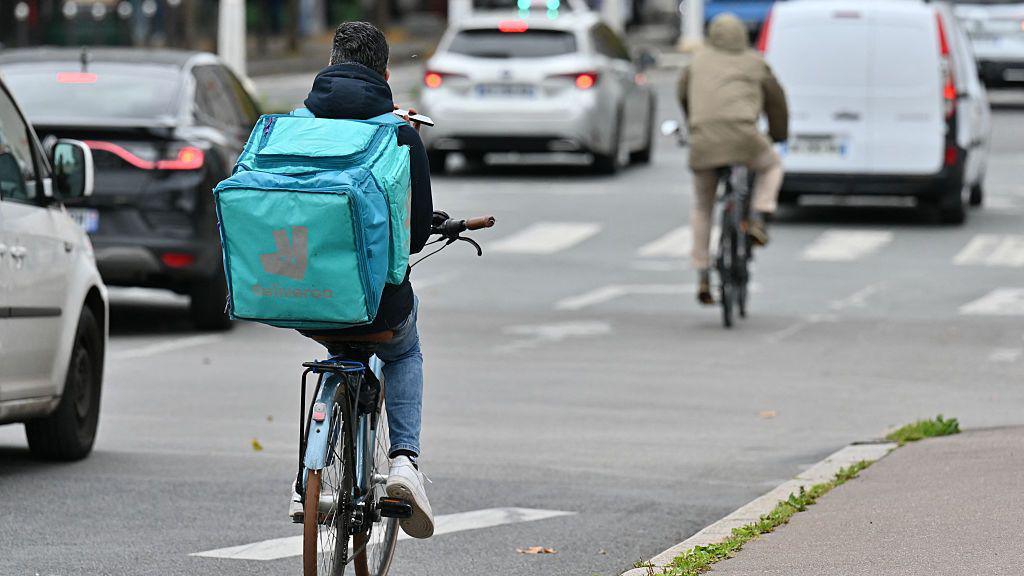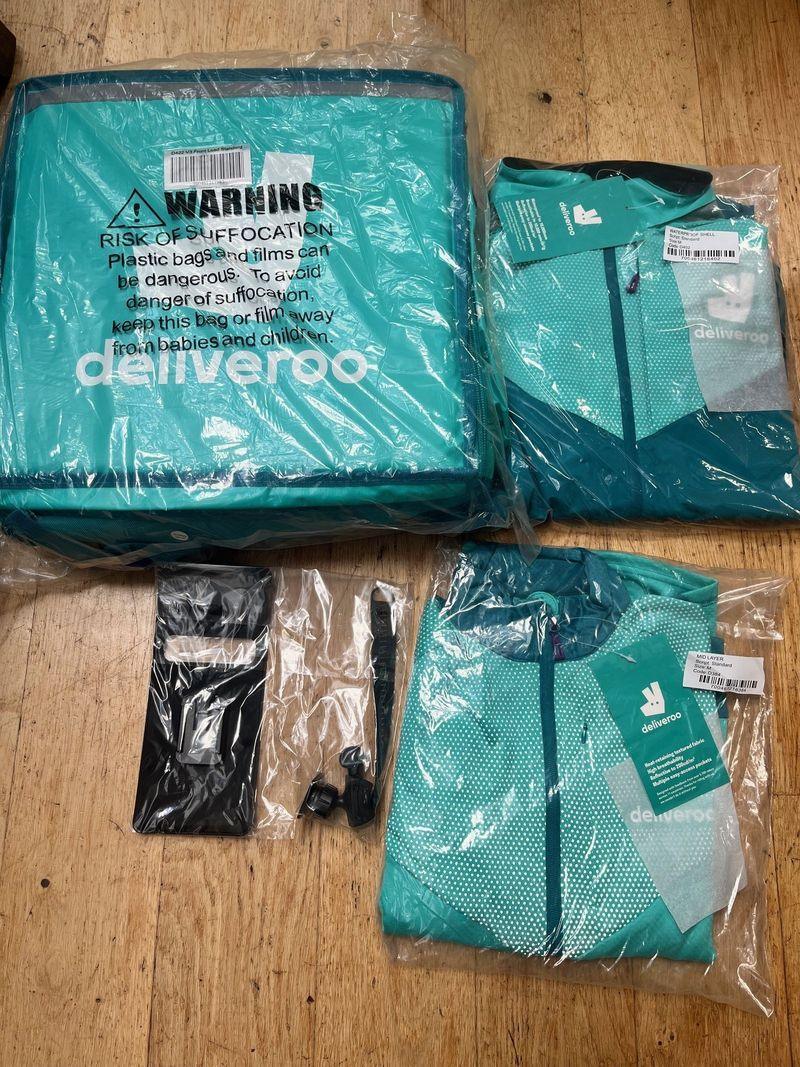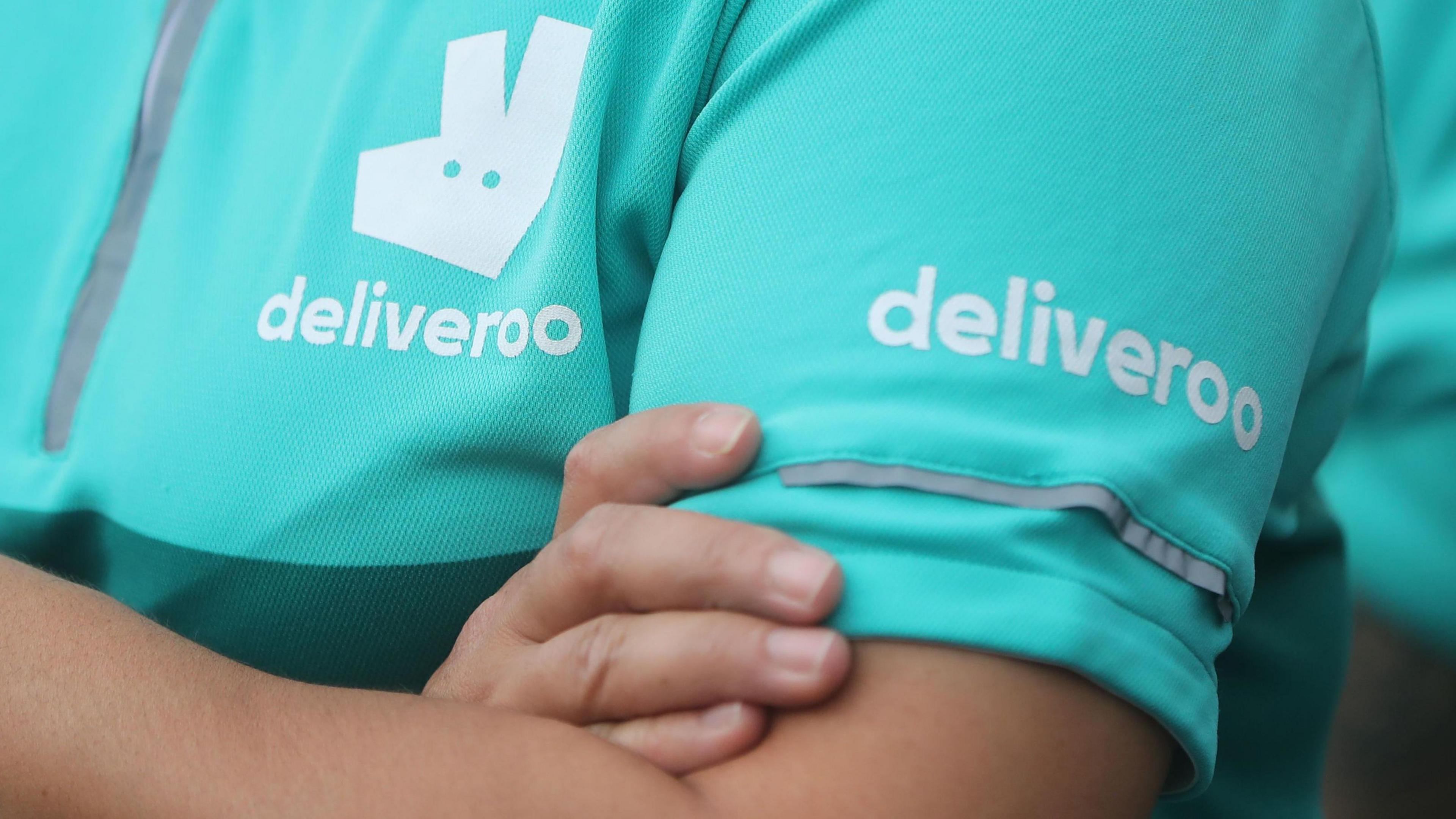The neighbours who received unwanted Deliveroo starter kits

A proof of address is needed to pass Deliveroo employment checks
- Published
A group of south London residents suspect a scam is going on, after their Thames Water accounts were hijacked and unsolicited Deliveroo rider kits appeared on their doorsteps.
Lizzy, not her real name, described how it all started with a message on her street's WhatsApp group chat at the end of August, as told to BBC Radio 4's You and Yours programme.
"A neighbour put a photo of a package on the group and said, 'Does anybody know this person?', Lizzy told the BBC, referring to the unfamiliar name on the package.
"Nobody did. The next day, a great big package was on my doorstep."

This Deliveroo starter kit was sent to Lizzy's home
Quickly, it became apparent that at least six members of the chat group had received a starter-kit parcel.
These were all addressed to names that the BBC has confirmed are common in Eritrea and northern Ethiopia.
"I opened it, and it was this starter pack. It had a waterproof top, another top, a big Deliveroo bag and a phone-holder of some sort," Lizzy continued.
"It just seemed very, very strange, which is why I thought there's some kind of scam going on."
Deliveroo said the six kits were intended for riders who had passed its right to work, criminal records and proof of address checks, but added it had suspended their accounts while it investigates.
The food delivery company also said that, as with many online shopping platforms, the website that the kits are ordered from allows buyers to choose delivery to any address, "for example, a place of work or as a gift".
Deliveroo's riders are self-employed rather than employees of the firm and this means they are able to get substitutes to do their work.
'Acted in good faith'
Two days after receiving that parcel, Lizzy got a final demand from Thames Water for more than £400. This was addressed to her house but to a man with a Romanian name who does not live there.
Lizzy contacted Thames Water to be told that her account had been closed, as someone else had opened an account at the same address.
"When I told my group chat, somebody said that they had had the same thing happen to them as well."
Thames Water said in a statement to You and Yours: "We take our responsibilities to protect our customers' personal data and maintain essential services extremely seriously.
"In respect of your listener's account, no unauthorised access to her data has occurred and there has been no data breach or fraudulent activity.
"Her account was incorrectly closed after we were informed that another customer was moving into the property.
"When she received a final bill from Thames Water, she contacted our customer teams who quickly reversed the incorrect account set up and reinstated her original account.
"Her billing and water consumption amounts are up-to-date based on the latest meter readings for her property, and we are sorry for any inconvenience caused."

Deliveroo riders are self-employed rather than staff of the food delivery company
Lizzy and her neighbours believe there is a link between the delivery of the Deliveroo starter packs and the Thames Water accounts being altered, but the BBC could not establish a clear link between the hijacking of Lizzy's Thames Water account in February and the Deliveroo rider kit that was sent to her at the end of August.
Lizzy and her neighbours believe this happened as a proof of address is needed to pass Deliveroo checks.
The BBC put this to Deliveroo and the company said: "None of the riders related to this investigation offered a utility bill as their proof of address.
"Unless there is any evidence of the issue with Thames Water being linked to the kit deliveries, it would be misleading and inaccurate to connect the two together in this piece.
"We strongly refute the suggestion that this issue is linked to substitution, or the self-employed status of riders. In this instance, all rider accounts associated with the deliveries were main account-holders, not substitutes, and therefore substitution is not relevant to the issue or conversation.
"It is also worth noting that to be a rider with Deliveroo (including a substitute rider), individuals must undergo a formal registration process. This process includes right-to-work checks which these riders successfully completed.
"We recognise that there is an issue here that requires a full investigation, and we are currently undertaking this, and are taking it very seriously."
Food delivery apps to tighten checks to stop illegal workers
- Published30 June
Children working for food delivery apps, BBC finds
- Published14 November 2023
It has been reported that rented accounts have been used by people with criminal convictions who would be prevented from getting rider accounts legitimately.
Matthew Cole, assistant professor of technology, work and employment at the University of Sussex, believes this all stems from the fact that Deliveroo riders' self-employed status means they can get substitutes to do their work - and the legal responsibility for vetting substitutes mostly falls on them and not Deliveroo.
"Substitutes rent accounts for £40 to £120 a week, depending on how highly rated the account is," Dr Cole said.
"Deliveroo has an algorithm that allocates work. Higher-rated accounts get more. The lack of regulation and oversight in this sector means it's in the interest of some of these companies to not pay too much attention."
Since this article was published Deliveroo has contacted the BBC to say it does not rate rider accounts on any basis nor does it offer work based on ratings or performance.
'Very desperate people'
At the end of June, the Home Office negotiated a voluntary agreement with Deliveroo to clamp down on the abuse of rider accounts and stop illegal working.
Riders will have to do random selfie ID checks to continue delivering. The government also shared locations of asylum seeker hotels with the food delivery company to prevent them being used as rider addresses.
Deliveroo told the BBC that substitute riders must also pass its initial right-to-work checks. Dr Cole has spoken to Deliveroo riders about this in the same part of London where Lizzy lives, as part of his research.
"All you need is a phone registered to someone who's passed the relevant checks and a few ready-to-hand selfies to continue working," he told the BBC.
"Many do this. You have a lot of very desperate people waiting for months appealing asylum decisions living in run-down hotels with no legal employment options.
"These people need some money and are going to find ways of getting it. Wherever there is a lack of regulation, there will be people taking advantage of that."
The BBC has been unable to contact for comment any of the six Deliveroo riders or the man who registered a Thames Water account at Lizzy's home.
Listen to the best of BBC Radio London on Sounds and follow BBC London on Facebook, external, X, external and Instagram, external. Send your story ideas to hello.bbclondon@bbc.co.uk, external